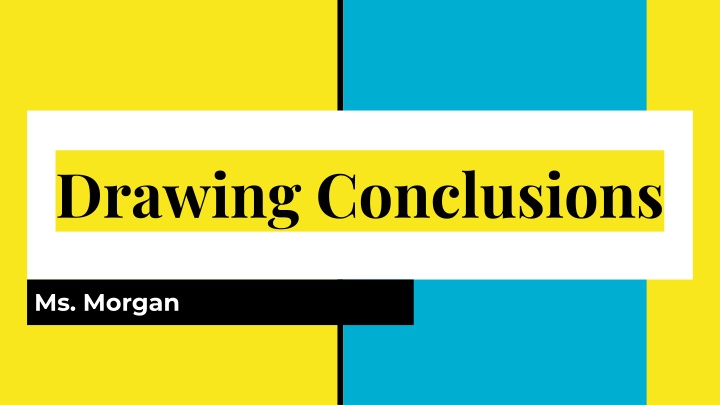
Drawing Conclusions
Learn how readers draw conclusions by examining clues, facts, and opinions within a passage or text. Explore examples, engage in scenarios, and grasp the essence of forming conclusions to enhance comprehension skills in reading.
Uploaded on | 0 Views
Download Presentation

Please find below an Image/Link to download the presentation.
The content on the website is provided AS IS for your information and personal use only. It may not be sold, licensed, or shared on other websites without obtaining consent from the author. If you encounter any issues during the download, it is possible that the publisher has removed the file from their server.
You are allowed to download the files provided on this website for personal or commercial use, subject to the condition that they are used lawfully. All files are the property of their respective owners.
The content on the website is provided AS IS for your information and personal use only. It may not be sold, licensed, or shared on other websites without obtaining consent from the author.
E N D
Presentation Transcript
Drawing Conclusions Ms. Morgan
Essential Question How does a reader draw conclusions?
Engagement Imagine you are walking down the street and you come across a house with overgrown grass that reaches waist-height, no lights in the windows, and paint that is peeling off the sides. What might you think about this house?
Engagement No one has lived there in a long time. You took the information I gave to you and drew a conclusion from it.
Drawing Conclusions When you draw conclusions you use two things: what you know in your head and what you ve read in the story. A conclusion is what you come to when you put these two together.
Example I sleep in a crib. I drink from a bottle. I cannot walk or talk. What am I?
Example I am white. You need me almost everyday. You drink me when you re thirsty. I can give you a moustache. What am I?
Example I grow on an ear. You cook me in hot oil. When heated, I puff up and taste good. Some people microwave me. What am I?
Fact / Opinion Knowing the difference between fact and opinion can help when drawing conclusions about a passage or reading. Fact - Can be proven. Supported by details in a story. Opinion- Cannot be proven. What someone thinks or feels.
Practice Sleeping in on Saturdays is a lot better than waking up early. Vanilla ice cream is better than strawberry ice cream. The next election year will be in 2024. Sixth grade is the highest grade level at Daniel Pratt. Summer is better than winter. It usually doesn t snow in Alabama. We did our performance testing last week.
